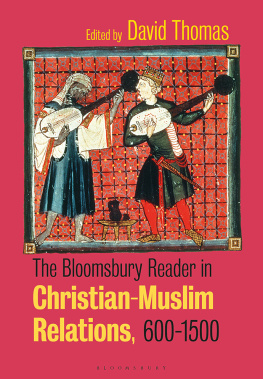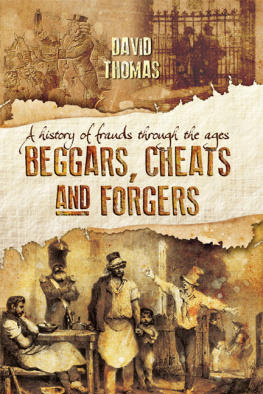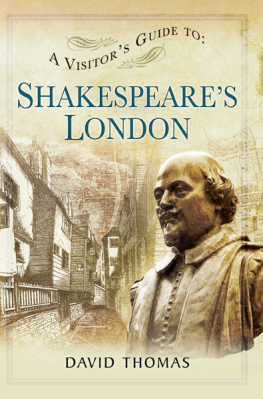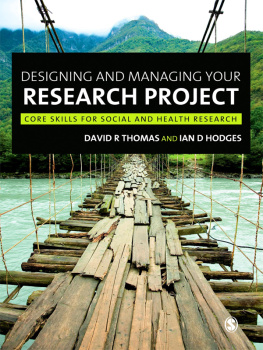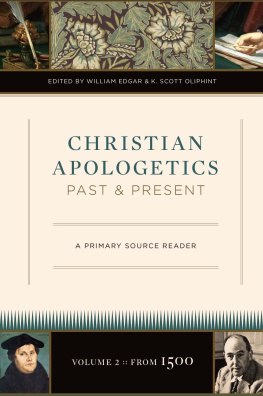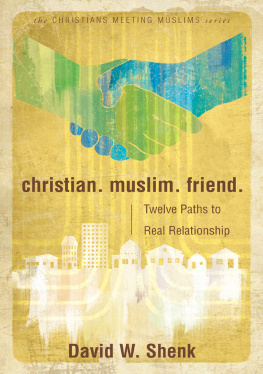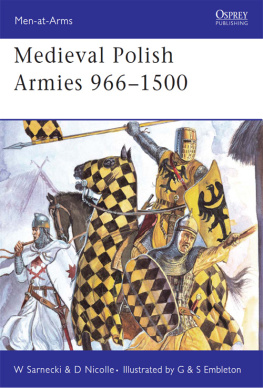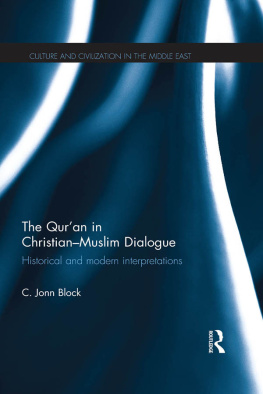David Thomas - The Bloomsbury Reader in Christian-Muslim Relations, 600-1500
Here you can read online David Thomas - The Bloomsbury Reader in Christian-Muslim Relations, 600-1500 full text of the book (entire story) in english for free. Download pdf and epub, get meaning, cover and reviews about this ebook. publisher: Bloomsbury UK (Minor Textbooks), genre: Religion. Description of the work, (preface) as well as reviews are available. Best literature library LitArk.com created for fans of good reading and offers a wide selection of genres:
Romance novel
Science fiction
Adventure
Detective
Science
History
Home and family
Prose
Art
Politics
Computer
Non-fiction
Religion
Business
Children
Humor
Choose a favorite category and find really read worthwhile books. Enjoy immersion in the world of imagination, feel the emotions of the characters or learn something new for yourself, make an fascinating discovery.
- Book:The Bloomsbury Reader in Christian-Muslim Relations, 600-1500
- Author:
- Publisher:Bloomsbury UK (Minor Textbooks)
- Genre:
- Rating:5 / 5
- Favourites:Add to favourites
- Your mark:
- 100
- 1
- 2
- 3
- 4
- 5
The Bloomsbury Reader in Christian-Muslim Relations, 600-1500: summary, description and annotation
We offer to read an annotation, description, summary or preface (depends on what the author of the book "The Bloomsbury Reader in Christian-Muslim Relations, 600-1500" wrote himself). If you haven't found the necessary information about the book — write in the comments, we will try to find it.
The Bloomsbury Reader in Christian-Muslim Relations, 600-1500 — read online for free the complete book (whole text) full work
Below is the text of the book, divided by pages. System saving the place of the last page read, allows you to conveniently read the book "The Bloomsbury Reader in Christian-Muslim Relations, 600-1500" online for free, without having to search again every time where you left off. Put a bookmark, and you can go to the page where you finished reading at any time.
Font size:
Interval:
Bookmark:
The Bloomsbury Reader in Christian-Muslim Relations, 6001500
ALSO AVAILABLE FROM BLOOMSBURY
The Bloomsbury Reader in the Study of Myth,
Edited by Jonathan Miles-Watson and Vivian Asimos
The Bloomsbury Reader in Cultural Approaches to the Study of Religion,
Edited by Sarah J. Bloesch and Meredith Minister
The Bloomsbury Reader in Religion, Sexuality, and Gender,
Edited by Donald L. Boisvert and Carly Daniel-Hughes
The Bloomsbury Reader in Christian-Muslim Relations, 6001500
EDITED BY DAVID THOMAS

Christian-Muslim relations
David Thomas, University of Birmingham
T his book is about relations between people of faith. It shows how their experiences of the other and stories they heard about them, together with their interpretations of their own scriptures, shaped their ideas of the other and their attitudes towards them. In the years 6001500, these were crucial in determining the ways in which Christians and Muslims dealt with one another.
In the latter years of his life, as ruler of a powerful state in western Arabia, the Prophet Muammad sent armies into the borders of the Eastern Roman Empire. After his death in 632, his successors continued this policy, and within a few decades great tracts to the north, east and west had come under Islamic rule. Most of the people the armies encountered in these regions were Christians, speakers of Arabic, Greek, Syriac and other languages. On the basis of references in the Quran, Muslims classified them as parts of a distinct religious community with its own revelation brought by the prophet s (Jesus). Together with the Jews and others who had also received revelations, they gave them the quranic name People of the Book (Ahl al-kitb). From an early date they imposed taxes on them, and within a short time they established rules to govern their conduct and their relations with themselves. These rules were gradually refined and particularized, and named the Pact of Umar, conferring on them the authority of the second caliph Umar ibn al-Khab (r. 63444).
Muslim rule continued over the captured areas, roughly comprising present-day Jordan, Iraq, Syria, Palestine and Egypt, from the first century of Islam, and later extended further through North Africa and into the Iberian Peninsula, and moved into Iran and Central Asia, Anatolia and south-eastern Europe. The populations of many parts of them were predominantly Christian, and it is here that meetings led to familiarity and engendered attitudes that profoundly affected dealings between them.
Muslims and Christians rarely encountered one another as friends, either within the Islamic Empire, where the one was conspicuously superior to the other, or outside, where encounters regularly took the form of armed confrontations. And if experience taught that relations were hostile, the scriptures of the two faiths showed why there could be no alternative.
On the Christian side, the New Testament portrays Jesus Christ as the climax of Gods relations with His creation. It suggests that the whole of history led up to his coming and that nothing after would change what he had been and done. In 1321, some Christians in Cyprus confidently explained this at the end of a letter they sent to Muammad ibn Ab lib al-Dimashq (d. 1327), a leading Muslim scholar of the day:
If the rank of the complete man born from Mary outstrips the ranks of all humans in exaltedness, including the prophets, the blessed and the angels, to the extent I have described of the creative Word of God and His Spirit uniting with him, then he must be perfection. And after this perfection there is nothing left to put in place, because everything that came before required it and there was no need for what came after it. For nothing can come after perfection and be superior, but must rather be inferior or derivative, and there is no need for what is derivative.
They make it unmistakably clear that there is no place for Islam in the divine plan, and by implication that Islam cannot be of God.
The attitude on the Muslim side was analogous, though it differed in detail. The Quran, as Gods direct word to humanity, taught that it itself was part of a succession of revelations brought by a line of prophetic messengers. These were all men (as it turned out) who had been chosen by God and sent to individual communities, and their messages were all essentially the same because they came from the one divine Source. The Quran was the culmination of this succession, and Muammad was the last in the line of messengers. Unlike his predecessors, he was sent to the whole world, and the Quran was universal in scope. This meant that Christianity, Judaism and other scriptural religions should yield to Islam, and their followers should become Muslims as they recognized its final authority. As al-Dimashq writes at the end of his reply to the Cypriots:
What a shame it is for you Christians, brothers in kind and in person! If only you would understand these words I have put before you, the things I have proved and made plain! But I hope, if God the exalted wills, that you will understand them, so that what is clear to us will become clear to you, and you will know that there is no god but God alone with no partner.
For him, any claims that challenge the uniqueness of God are demonstrably wrong, so Christian teachings must be mistaken.
Christians maintain that the Bible says nothing about Islam or Muammad (though this would be hotly disputed by Muslims). All it does say is that Jesus is the final word from God. On the other hand, the Quran is very detailed in what it says about Jesus and Christianity. Its main theme is that God is one, so it follows that Christian claims that God is three and that Jesus is His Son are wrong. Messengers before Muammad attested to this, and so did the scriptures they brought. As one of these messengers, the human Jesus expressly denied being divine or Son of God, despite being born of a virgin or being raised to God instead of dying on the cross. The Injl was a revelation in the form of a single scripture brought by Jesus, but the People of the Book (including Christians) concealed, substituted or corrupted their scriptures. In saying these things, it is as though the Quran is answering points made by Christians and correcting them.
Among Christians throughout the Islamic world knowledge about Islam must have increased quickly, and it would also have spread beyond. Within a century, exchanges between followers of the two faiths are recorded from both the Arab heartlands and the West, while works about and against Islam appeared in Greek, Syriac, Armenian and Latin. At the time of the Crusades in the eleventh to thirteenth centuries the number of works in Latin grew enormously, and at about the same time works in vernacular European languages also appeared. Nearly all of them exhibit a fascinating variety of argumentative strategies. A noticeable trait in works by both Muslims and Christians is that as they developed points introduced by earlier authors, they often reproduced the same arguments as them. In this way, traditions of polemic came into being and continued through the period of 6001500 and well beyond, as far as the nineteenth century and to the present. It also suggests that these traditions frequently replaced live encounters and fresh direct information.
On the Muslim side, these arguments were inspired directly by the Quran. With regard to the being of God, theologians fashioned rational proofs that the doctrine of the Trinity could not be reconciled with monotheism because the three divine Persons could not be reduced to a single Being. They likewise showed that the Incarnation was illogical because it involved the infinite Divinity becoming limited within the body of Jesus. With regard to the Gospels and Torah, they found verses that could be interpreted to refer to Muammad among the most frequently cited were the Paraclete verses in the Gospel of John or they argued that the actual texts had been corrupted, either deliberately or through disasters, and were no longer reliable.
Next pageFont size:
Interval:
Bookmark:
Similar books «The Bloomsbury Reader in Christian-Muslim Relations, 600-1500»
Look at similar books to The Bloomsbury Reader in Christian-Muslim Relations, 600-1500. We have selected literature similar in name and meaning in the hope of providing readers with more options to find new, interesting, not yet read works.
Discussion, reviews of the book The Bloomsbury Reader in Christian-Muslim Relations, 600-1500 and just readers' own opinions. Leave your comments, write what you think about the work, its meaning or the main characters. Specify what exactly you liked and what you didn't like, and why you think so.

